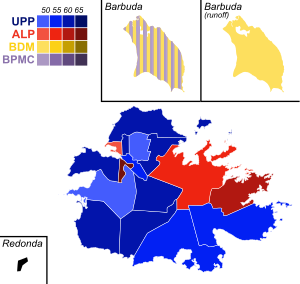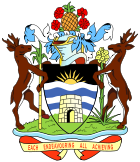| |||||||||||||||||||||||||||||||||
All 17 seats in the House of Representatives 9 seats needed for a majority | |||||||||||||||||||||||||||||||||
|---|---|---|---|---|---|---|---|---|---|---|---|---|---|---|---|---|---|---|---|---|---|---|---|---|---|---|---|---|---|---|---|---|---|
| Turnout | 91.19% ( | ||||||||||||||||||||||||||||||||
| |||||||||||||||||||||||||||||||||
 Results by constituency | |||||||||||||||||||||||||||||||||
| |||||||||||||||||||||||||||||||||
 |
|---|
General elections were held in Antigua and Barbuda on 23 March 2004. The result was a victory for the opposition United Progressive Party (UPP), which defeated the incumbent Antigua Labour Party. Baldwin Spencer, leader of the UPP, replaced Lester Bird as Prime Minister of Antigua and Barbuda, with Bird being one of eight Labour MPs to lose his seat. Spencer became only the second Prime Minister from outside the Bird family or the Labour Party.
Bird had been Prime Minister since 1994, when he succeeded his father, Vere Bird, who had been Prime Minister from independence in 1981, having previously served as Chief Minister or Premier of Antigua since 1960 with the exception of the 1971–1976 period.
YouTube Encyclopedic
-
1/5Views:12 069 7889112 003659867
-
The European Union Explained*
-
Caribbean Political Futures
-
Culture and Social Movements - Election 2020: UC Berkeley Big Ideas
-
Is the End in Sight? The Monarchy and Commonwealth Realms
-
A Revolution Betrayed: Daniel Ortega's 'Shoot to Kill' Policy | Bianca Jagger | SOAS
Transcription
Where, is the European Union? Obviously here somewhere, but much like the the European continent itself, which has an unclear boundary, the European Union also has some fuzzy edges to it. To start, the official members of the European Union are, in decreasing order of population: * Germany * France * The United Kingdom * Italy * Spain * Poland * Romania * The Kingdom of the Netherlands * Greece * Belgium * Portugal * The Czech Republic * Hungary * Sweden * Austria * Bulgaria * Denmark * Slovakia * Finland * Ireland * Croatia * Lithuania * Latvia * Slovenia * Estonia * Cyprus * Luxembourg * Malta The edges of the EU will probably continue to expand further out as there are other countries in various stages of trying to become a member. How exactly the European Union works is hideously complicated and a story for another time, but for this video you need know only three things: 1. Countries pay membership dues and 2. Vote on laws they all must follow and 3. Citizens of member countries are automatically European Union citizens as well This last means that if you're a citizen of any of these countries you are free to live and work or retire in any of the others. Which is nice especially if you think your country is too big or too small or too hot or too cold. The European Union gives you options. By the way, did you notice how all three of these statements have asterisks attached to this unhelpful footnote? Well, get used to it: Europe loves asterisks that add exceptions to complicated agreements. These three, for example, point us toward the first bit of border fuzziness with Norway, Iceland and little Liechtenstein. None of which are in the European Union but if you're a EU citizen you can live in these countries and Norwegians, Icelanders, or Liechtensteiner(in)s can can live in yours. Why? In exchange for the freedom of movement of people they have to pay membership fees to the European Union -- even though they aren't a part of it and thus don't get a say its laws that they still have to follow. This arrangement is the European Economic Area and it sounds like a terrible deal, were it not for that asterisk which grants EEA but not EU members a pass on some areas of law notably farming and fishing -- something a country like Iceland might care quite a lot about running their own way. Between the European Union and the European Economic Area the continent looks mostly covered, with the notable exception of Switzerland who remains neutral and fiercely independent, except for her participation in the Schengen Area. If you're from a country that keeps her borders extremely clean and / or well-patrolled, the Schengen Area is a bit mind-blowing because it's an agreement between countries to take a 'meh' approach to borders. In the Schengen Area international boundaries look like this: no border officers or passport checks of any kind. You can walk from Lisbon to Tallinn without identification or need to answer the question: "business or pleasure?". For Switzerland being part of Schengen but not part of the European Union means that non-swiss can check in any time they like, but they can never stay. This koombaya approach to borders isn't appreciated by everyone in the EU: most loudly, the United Kingdom and Ireland who argue that islands are different. Thus to get onto these fair isles, you'll need a passport and a good reason. Britannia's reluctance to get fully involved with the EU brings us to the next topic: money. The European Union has its own fancy currency, the Euro used by the majority, but not all of the European Union members. This economic union is called the Eurozone and to join a country must first reach certain financial goals -- and lying about reaching those goals is certainly not something anyone would do. Most of the non-Eurozone members when they meet the goals, will ditch their local currency in favor of the Euro but three of them Denmark, Sweden and, of course, the United Kingdom, have asterisks attracted to the Euro sections of the treaty giving them a permanent out-out. And weirdly, four tiny European countries Andorra, San Marino, Monaco & Vatican City have an asterisk giving them the reverse: the right print and use Euros as their money, despite not being in the European Union at all. So that's the big picture: there's the EU, which makes all the rules, the Eurozone inside it with a common currency, the European Economic Area outside of it where people can move freely and the selective Schengen, for countries who think borders just aren't worth the hassle. As you can see, there's some strange overlaps with these borders, but we're not done talking about complications by a long shot one again, because empire. So Portugal and Spain have islands from their colonial days that they've never parted with: these are the Madeira and Canary Islands are off the coast of Africa and the Azores well into the Atlantic. Because these islands are Spanish and Portuguese they're part of the European Union as well. Adding a few islands to the EU's borders isn't a big deal until you consider France: the queen of not-letting go. She still holds onto a bunch of islands in the Caribbean, Reunion off the coast of Madagascar and French Guiana in South America. As far as France is concerned, these are France too, which single handedly extends the edge-to-edge distance of the European Union across a third of Earth's circumference. Collectively, these bits of France, Spain and Portugal are called the Outermost Regions -- and they're the result of the simple answer to empire: just keep it. On the other hand, there's the United Kingdom, the master of maintaining complicated relationships with her quasi-former lands -- and she's by no means alone in this on such an empire-happy continent. The Netherlands and Denmark and France (again) all have what the European Union calls Overseas Territories: they're not part of the European Union, instead they're a bottomless well of asterisks due to their complicated relationships with both with the European Union and their associated countries which makes it hard to say anything meaningful about them as a group but... in general European Union law doesn't apply to these places, though in general the people who live there are European Union citizens because in general they have the citizenship of their associated country, so in general they can live anywhere in the EU they want but in general other European Union citizens can't freely move to these territories. Which makes these places a weird, semipermeable membrane of the European Union proper and the final part we're going to talk about in detail even though there are still many, more one-off asterisks you might stumble upon, such as: the Isle of Man or those Spanish Cities in North Africa or Gibraltar, who pretends to be part of Southwest England sometimes, or that region in Greece where it's totally legal to ban women, or Saba & friends who are part of the Netherlands and so should be part of the EU, but aren't, or the Faeroe Islands upon which while citizens of Denmark live they lose their EU citizenship, and on and on it goes. These asterisks almost never end, but this video must.
Campaign
The Bird family was widely accused of corruption and nepotism. The Jamaica Observer noted that "Bird's government had been badly damaged by scandals that in recent years have centred on allegations of bribery, misuse of funds in the national health insurance plan, and a 13-year-old girl's charges that he and his brother used her for sex and to procure cocaine. Bird, 72, denied the last charges and organised an inquiry that found no evidence."
Bird's brother, Vere Bird, Jr., was accused of involvement with the Medellin drug cartel in 1989. He lost his Cabinet post, but was not prosecuted.
Conduct
An observer team from the Caribbean Community praised the peaceful vote and said the results "clearly reflect the will of the people". Among recommendations, it urged the Electoral Commission to strengthen its independence. Previous elections in Antigua and Barbuda had been followed by allegations of electoral irregularities favouring the government.
Results
The vote in the seat of Barbuda ended in a draw between the Barbuda People's Movement, an ally of the UPP, and the Barbuda People's Movement for Change, an ally of the ALP, with each candidate receiving 400 votes. A by-election was held on 20 April, which saw Trevor Walker of the BPM elected, with 408 votes against 394 for the BPMC candidate, Arthur Nibbs.[1]
| Party | Votes | % | Seats | +/– | |
|---|---|---|---|---|---|
| United Progressive Party | 21,892 | 55.50 | 12 | +8 | |
| Antigua Labour Party | 16,544 | 41.94 | 4 | –8 | |
| Barbuda People's Movement | 400 | 1.01 | 1 | 0 | |
| Barbuda People's Movement for Change | 400 | 1.01 | 0 | New | |
| Independents | 209 | 0.53 | 0 | 0 | |
| Total | 39,445 | 100.00 | 17 | 0 | |
| Valid votes | 39,445 | 99.54 | |||
| Invalid/blank votes | 184 | 0.46 | |||
| Total votes | 39,629 | 100.00 | |||
| Registered voters/turnout | 43,456 | 91.19 | |||
| Source: Caribbean Elections | |||||
References
- ^ Antigua and Barbuda: 2004 election results Archived 29 June 2021 at the Wayback Machine Caribbean Elections



